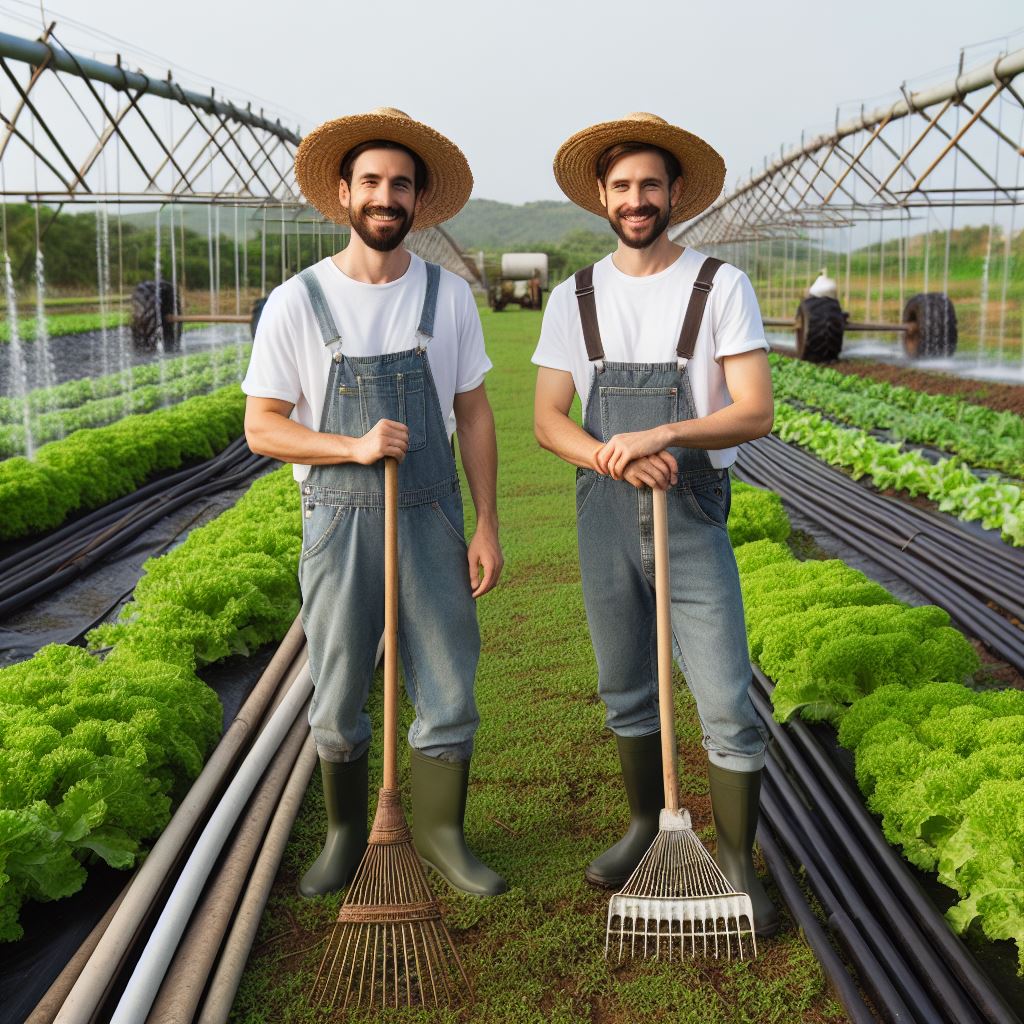Introduction
Agricultural practices have evolved over time, with a debate arising between organic and conventional farming.
Understanding the differences between the two approaches is crucial for consumers and farmers alike.
This blog section aims to provide a thorough analysis of the topic.
Organic farming entails using natural methods, avoiding synthetic pesticides and fertilizers, while conventional farming relies on chemicals to maximize crop yield.
These two methods have distinct implications for the environment, economy, and human health.
Consumers need to make informed choices about the food they consume, considering health and environmental factors.
Farmers also need to weigh the pros and cons of each approach to maximize productivity and sustainability on their farms.
This section will delve into the benefits and drawbacks of both organic and conventional farming.
By exploring scientific research, expert opinions, and real-world experiences, we seek to provide a comprehensive understanding of these agricultural practices.
Ultimately, readers will be equipped with the knowledge to make informed decisions and contribute to the ongoing debate.
Join us on this exploration of organic vs conventional farming, where we unveil the intricacies and consequences of each approach.
Overview of Organic Farming
Definition and principles of organic farming
Organic farming is a system of agriculture that focuses on using natural and sustainable practices.
Benefits of organic farming
Environmental benefits
Organic farming helps to preserve soil fertility and reduce soil erosion and degradation.
It also promotes biodiversity and protects the environment from harmful chemicals and pesticides.
Health benefits
Organic food is free from synthetic pesticides, hormones, and genetically modified organisms (GMOs).
Transform Your Agribusiness
Unlock your farm's potential with expert advice tailored to your needs. Get actionable steps that drive real results.
Get StartedThis reduces the risk of exposure to harmful chemicals and provides consumers with healthier options.
Challenges and limitations of organic farming
Higher cost and resource requirements
Organic farming often demands more labor-intensive practices and requires higher initial investments.
It also requires the use of expensive organic inputs and certification processes, leading to higher costs for farmers.
Crop yields and food production concerns
One of the major challenges faced by organic farming is its lower crop yields compared to conventional farming.
This can lead to concerns about meeting the growing global food demand and feeding the increasing population.
Despite these limitations, organic farming plays an important role in promoting environmental sustainability and providing healthier food options.
Read: Organic Farming Trends: What’s Next?
Overview of Conventional Farming
Definition and practices of conventional farming
- Conventional farming refers to the mainstream method of agriculture that utilizes synthetic inputs and modern technologies.
- It involves the use of chemical fertilizers, pesticides, and genetically modified organisms (GMOs) to maximize crop yields.
- Methods such as monocropping and intensive livestock production are commonly employed in conventional farming.
Advantages of conventional farming
Increased productivity and efficiency
Conventional farming techniques have significantly boosted agricultural output, ensuring food security for an ever-growing global population.
Cost-effectiveness
The adoption of modern machinery and genetically engineered seeds has helped reduce production costs for farmers.
Concerns and drawbacks of conventional farming
Environmental impact
Conventional farming practices contribute to soil degradation, water pollution, and loss of biodiversity due to the excessive use of synthetic inputs.
Health risks associated with chemical use:
The prolonged exposure to pesticides and synthetic fertilizers in conventional farming may pose risks to human health, including the development of pesticide-resistant diseases and harmful effects on the nervous system.
Despite its advantages, conventional farming has been subjected to criticism for its negative environmental and health implications.
The heavy reliance on synthetic inputs and monocultures has raised concerns about the sustainability and resilience of this agricultural approach.
The long-term consequences of chemical use on both ecosystems and human health are still subjects of ongoing research and debate.
Improving the sustainability of conventional farming practices is essential to minimize its negative impact on the environment.
Integrated Pest Management (IPM), for instance, aims to reduce chemical dependence by integrating biological control methods and organic farming principles.
Additionally, adopting precision agriculture techniques can enhance resource efficiency and reduce waste in conventional farming systems.
In recent years, the organic farming movement has gained momentum as an alternative to conventional farming.
Organic farming emphasizes the use of natural inputs, crop rotation, and ecological practices to promote biodiversity and soil health.
While organic farming has its own set of advantages, it also faces challenges related to lower yields and higher production costs.
In short, conventional farming, with its focus on maximizing yield and efficiency, has played a significant role in feeding the growing global population.
However, its impact on the environment and human health should not be overlooked. Balancing productivity with sustainability is crucial for the future of agriculture.
By adopting innovative techniques, conventional farming can evolve towards a more environmentally-friendly and health-conscious approach.
Read: Pollinators: Heroes of Organic Farming
Showcase Your Farming Business
Publish your professional farming services profile on our blog for a one-time fee of $200 and reach a dedicated audience of farmers and agribusiness owners.
Publish Your ProfileComparison of Organic and Conventional Farming
When comparing organic and conventional farming, it is essential to look at various aspects of production, impact on soil health and biodiversity, nutritional value, and food safety.
Production methods
In terms of production methods, conventional farming relies on the use of synthetic chemicals for pest control.
This approach raises concerns about the potential health and environmental impacts of such chemicals.
On the other hand, organic farming employs natural alternatives like crop rotation and natural pest control methods, minimizing the use of synthetic chemicals.
Impact on soil health and biodiversity
The impact on soil health and biodiversity is another critical factor.
Organic farming practices prioritize soil fertility and biodiversity, employing techniques that maintain and enhance the natural ecosystem.
In contrast, conventional farming practices can lead to soil degradation and a decline in biodiversity due to the heavy use of chemicals and monoculture cultivation.
Nutritional value and taste
The nutritional value and taste of organic versus conventional produce have been a subject of debate.
Several studies have compared the nutritional content of both types of farming.
While some research indicates minimal differences, others suggest that organic food may contain higher levels of certain nutrients, mainly due to the healthier soil in which they are grown.
Flavor can also be influenced by factors like soil quality, growing conditions, and post-harvest handling practices.
Food safety
Food safety is a crucial concern for consumers. Pesticide residue and contamination worries are more prevalent in conventional farming due to the use of synthetic chemicals.
However, it’s important to note that both organic and conventional farming are subject to regulatory measures and testing to ensure food safety and minimize potential risks to consumers.
In general, the comparison between organic and conventional farming reveals differences in production methods, impact on soil health and biodiversity, nutritional value, and food safety.
Organic practices prioritize natural alternatives, promoting soil fertility and biodiversity.
Studies on nutritional content and flavor show varying results, influenced by factors like soil quality and growing conditions.
Lastly, both organic and conventional farming adhere to regulatory measures to ensure food safety.
Ultimately, consumers must weigh the benefits and potential drawbacks of each farming method to make informed choices about the food they consume.
Read: Local Markets: The Impact of Organic Produce

Consumer Perspective and Buying Choices
Consumer awareness and preferences
- Consumers are increasingly becoming more aware of the differences between organic and conventional products.
- Many consumers prefer organic products as they believe they are healthier and better for the environment.
- Awareness campaigns and educational resources have played a significant role in shaping consumer preferences.
Factors influencing consumer decisions
Health concerns
- Consumers are concerned about the potential health risks associated with pesticides and chemical additives used in conventional farming.
- Organic products are perceived to contain fewer harmful chemicals, making them a safer choice for consumers.
Environmental considerations
- Growing awareness of the impact of conventional farming on the environment has led consumers to choose organic products.
- Organic farming practices are seen as more sustainable, as they prioritize soil health, biodiversity, and water conservation.
Market trends and growth of the organic sector
- The organic market has witnessed significant growth in recent years.
- Increasing consumer demand for organic products has driven the expansion of the organic sector.
- Government policies and regulations supporting organic farming have also contributed to market growth.
- Innovative marketing strategies and product labeling have made it easier for consumers to identify and choose organic products.
- The availability and variety of organic products have also increased, further attracting consumers to the organic sector.
- Online shopping platforms and organic food delivery services have provided convenience and accessibility to consumers.
- The organic sector is expected to continue experiencing steady growth as more consumers prioritize health, sustainability, and environmental conservation.
In a nutshell, consumer awareness and preferences play an essential role in shaping buying choices between organic and conventional products.
Factors such as health concerns and environmental considerations heavily influence consumers’ decisions.
The growth of the organic sector is driven by increasing consumer demand, government support, and marketing strategies.
As the market expands and organic options become more accessible, consumers are likely to continue embracing organic products for their perceived health benefits and positive environmental impact.
Read: Organic Certification: Process and Benefits
Conclusion
Throughout this analysis, we have explored the differences between organic and conventional farming methods.
We have examined the impact on human health, the environment, and the overall sustainability of each approach.
While both organic and conventional farming have their advantages and disadvantages, it is important to continue research into sustainable farming practices.
This will help improve both methods and find innovative solutions to feed our growing population without harming the planet.
In my opinion, transitioning towards more organic and sustainable farming practices is crucial for the future of our planet and the well-being of future generations.
By supporting organic farming and advocating for stricter regulations on conventional farming, we can create a healthier and more sustainable food system.
It is also essential for individuals to be informed consumers and make conscious choices about the food they purchase.
By choosing organic products or supporting local farmers and responsible agricultural practices, we can contribute to a more sustainable and healthy food system.
The debate between organic and conventional farming methods is complex, and there is still much to be learned.
However, by considering the evidence presented in this analysis and continuing to promote sustainable agriculture, we can work towards a better future for our planet and ourselves.
Let us make informed choices and take steps towards a more sustainable and organic food system.




